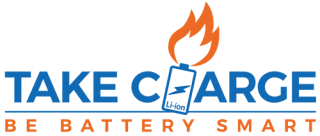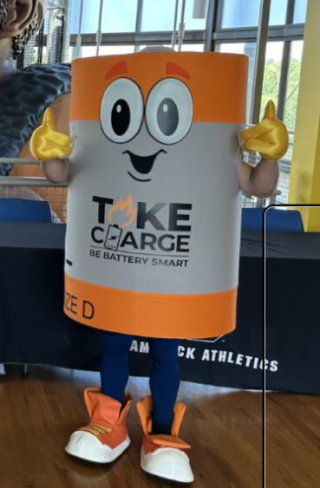Battery Collection in Action Case Study: South Carolina's Engaged Partnerships Promote Battery Safety and Education
On this page:
Introduction

In 2023, the Office of Solid Waste Reduction and Recycling, a division within the South Carolina Department of Environmental Services, launched the "Take Charge! Be Battery Smart" educational program in partnership with the Recycled Materials Association. The educational program promotes awareness of battery safety, fire prevention, and recycling opportunities across the state.
South Carolina supports waste collection and reduction through technical assistance, grants, and outreach and education programs. A team of eight runs the "Take Charge! Be Battery Smart" program, alongside other educational campaigns for food waste prevention and recycling. The program aims to educate children and residents through online information and community and school outreach.
Program Design and Implementation
The Recycled Materials Association approached South Carolina to develop the battery program after seeing the team's success with a food waste prevention initiative. The original program lead in South Carolina's Office of Solid Waste Reduction and Recyling then began researching existing programs and reviewing the types of batteries these programs address. He identified two key concerns in his research: button batteries and lithium-ion battery fires.
The team found that although many hospital websites emphasize button batteries as choking hazards for children, public awareness of other risks was limited. Fire departments also struggled to educate communities about increasing risks of battery fires. For example, in March 2025, the North Charleston Fire Department reported at least 13 lithium-ion battery fires over a six- to eight-month period. In response to the limited information they found online, the team designed webpages dedicated to fire prevention tips and button battery safety practices. For the battery fire webpage, staff consulted several fire associations and the State Fire Marshal to ensure information accuracy.
Although button and lithium-ion batteries were the initial focus of the program, online materials also cover:
- Guidance on where and how to recycle batteries safely throughout South Carolina, including through counties and vendors such as Redwood Materials.
- Step-by-step instructions for preparing batteries for recycling, such as sorting by type, taping terminals, storing batteries safely, and isolating damaged batteries.
- Battery identification resources to help users recognize types, sizes, and common uses of household batteries.
In addition to online resources, staff developed "Be Battery Smart: A Battery Safety Lesson" (pdf)(874 KB) for fourth graders, aligning it with state science standards. The team contracts with a vendor to train 2,000 teachers across the state to deliver the lesson. The vendor also distributes posters and infographics in schools, placing them in high-visibility areas such as hallways and science classrooms. These materials reach 30,000 to 40,000 students annually.
To publicize the campaign, the South Carolina Department of Environmental Services Media Relations department organized a press conference with the Lieutenant Governor and representatives from South Carolina Department of Environmental Services and Recycled Materials Association on November 7, 2023. The Department's Office of Solid Waste Reduction and Recycling continues to promote the program through community outreach at events such as homeowner association meetings, church gatherings, and minor league baseball games. The team educates residents on battery recycling opportunities and the dangers that batteries pose to sanitation workers, recycling center employees, and first responders. In addition to outreach events, staff engage with residents through social media and answer questions about battery safety and disposal via phone and email.
Program Funding

Initially, labor was the program's main cost, with approximately $15,000 in staff time spent on developing, delivering, designing, reviewing, and publicizing educational materials. Two staff members led research, writing, and editing efforts, while others reviewed materials. The Office's graphic artist designed posters and infographics, providing a cost-effective and efficient alternative to contracting external help.
Currently, one employee leads the program with peer support for coordinating outreach to schools, local government, and businesses. The South Carolina Department of Environmental Services administration reviews and approves all materials before publication. Printing for posters and residential lithium-ion safety guidebooks costs $1,500 annually. The Office saves money on printing by using internal resources and support from the South Carolina Department of Corrections.
Statewide recycling fees fund program costs. A one-time $25,000 grant from the U.S. Environmental Protection Agency's Solid Waste Infrastructure for Recycling program supplemented the program. These funds cover purchases the program cannot otherwise afford, including educational outreach materials and battery storage boxes.
Evaluation Metrics
Since the program's launch in November 2023, South Carolina has seen an approximately 1,000-percent increase in the tons of batteries collected. Counties must report recycling amounts by commodity to the Office of Solid Waste Reduction and Recycling, though the accuracy may vary due to differing data collection methods. The Office is currently conducting a municipal solid waste characterization study (also with funding from EPA's Solid Waste Infrastructure for Recycling program) that will provide more comprehensive battery disposal data, expected to be available in January 2026.
Insights and Next Steps
The program's success is bolstered by partners such as Palmetto Poison Center, Redwood Materials, the Recycled Materials Association, and the South Carolina Consumer Affairs Department. They provide specialized resources, expertise, visibility, and feedback, which improve the accuracy and quality of materials. Chesley noted that earlier engagement with partners, especially the Department of Consumer Affairs, would have been beneficial due to their established outreach channels, including webinars and podcasts for seniors. Future plans involve collaborating with the Palmetto Poison Center to distribute button and coin battery posters in doctors' offices and daycare centers, increasing visibility in public health settings.
The program's greatest challenge is informing residents about the environmental, health, and safety impacts of batteries. To address this challenge, the team regularly updates their website and explores new outreach opportunities, including launching a statewide rechargeable battery public service announcement contest for high school students and producing informational videos featuring the new mascot, Sparky. The Office of Solid Waste Reduction and Recycling will be offering a solid waste professional certification to recycling coordinators in October 2025, which will help local governments increase awareness about proper rechargeable battery management.
